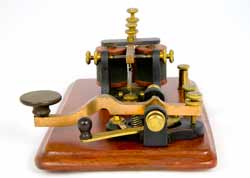Camelback Morse telegraph Key
The Camelback Morse key was first introduced around 1848 offering some advantages over the Lever Correspondent key initially used by Morse
Morse Telegraph History Includes:
Morse telegraph history
Morse keys development
Vibroplex & mechanical bug keys
Telegraph sounder
Morse inker
Samuel Morse
Fascinating facts
Morse code SOS message
Morse keys:
Clipsal key
Camelback
Walters Electrical Patt 1056A Post Office key
Steel lever Morse telegraph key
RAF Bathtub Morse key
Samson ETM-5C electronic keyer
The Camelback or "Humpback" is a type of Morse key that was first introduced in the early days of the Morse telegraph system.
The camelback has a very distinctive shape with a "hump" in the lever of the key and this hump has resulted in it being given its name of a Camelback Morse telegraph key.
Camelback keys or Humpback keys as they wee occasionally called were produced by a variety of companies both in the USA where they were first seen, and a little later in Europe.

This one dates from between 1850 and 1860. It has no adjustment on the spring and therefore dates from before 1860. Note the "hump" in its back that gives it the name.
Story of the Camelback key
The first Camelback Morse telegraph keys were developed after the Lever Correspondent keys which were the first type of key used on the Morse telegraph system and they first appeared around 1848.
The Lever Correspondent keys used by Morse used a leaf spring to keep the key up when it did not need to be depressed. As the leaf spring did not give the best response, the aim of the hump in the Camelback was to shift the weight to the rear of the lever for easier operation. It also gave a more stylish appearance and this may have helped the sales?
The Camelback keys were produced by a variety of telegraph key manufacturers. Thomas Hall was an early manufacturer as was Phelps and others.
 Written by Ian Poole .
Written by Ian Poole .
Experienced electronics engineer and author.
More History:
Radio history timeline
History of the radio
Ham radio history
Coherer
Crystal radio
Magnetic detector
Spark transmitter
Morse telegraph
Valve / tube history
PN junction diode invention
Transistor
Integrated circuit
Quartz crystals
Classic radios
Mobile telecoms history
Vintage mobile phones
Return to History menu . . .


